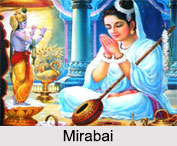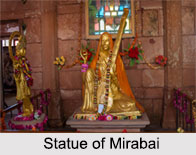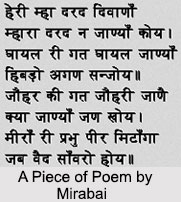 Mirabai was a great Vaishnava saint and a devotee of Sri Krishna. She composed a lot of devotional "bhajans". Born in the late 15th century into a royal family of Rajasthan; Mirabai, from her childhood was a great devotee of Lord Krishna and wrote many beautiful poems in praise of her Lord Krishna. She is one of the earliest poets known in Hindi literature. Mirabai lives in the minds and hearts of people through her works. She is a celebrated Bhakti Saint of India.
Mirabai was a great Vaishnava saint and a devotee of Sri Krishna. She composed a lot of devotional "bhajans". Born in the late 15th century into a royal family of Rajasthan; Mirabai, from her childhood was a great devotee of Lord Krishna and wrote many beautiful poems in praise of her Lord Krishna. She is one of the earliest poets known in Hindi literature. Mirabai lives in the minds and hearts of people through her works. She is a celebrated Bhakti Saint of India.
Early Life of Mirabai
Mirabai"s birth has been estimated to have occurred in 1498, and her birthplace was Merta, Rajasthan. Her father was Ratan Singh, a descendent of Rao Rathore, the founder of Jodhpur. When Mirabai was only three years old, a travelling saint came to her house and gave a doll of Sri Krishna to her father. Her father saw this as a special blessing but was at first reluctant to give it to her daughter, because he felt she would not be appreciative for it.
Though, at first sight Mira become extremely hooked with this representation of Lord Krishna. She resolved to make Krishna her lifelong friend, lover and husband. Mira was brought up by her grandfather Rao Dudaji, who was a religious Vaishnav. Mira received lessons in religion, politics and government from him. She was also well educated in music and art as well.
 Mira"s father arranged for her to be married to Prince Bhoj Raj in 1516, at the age of 18 years. Mira was not besotted of the luxuries of the palace. She served her husband loyally, but in the evening she would spend her time in devotion and singing for Lord Krishna. While singing devotional "bhajans",she often lost awareness of the world and entered into state of happiness.
Mira"s father arranged for her to be married to Prince Bhoj Raj in 1516, at the age of 18 years. Mira was not besotted of the luxuries of the palace. She served her husband loyally, but in the evening she would spend her time in devotion and singing for Lord Krishna. While singing devotional "bhajans",she often lost awareness of the world and entered into state of happiness.
Legends of Mirabai
Unfortunately, Bhoj Raj died in a battle in the year 1521. Mira began to dedicate more time to her religious practices. She danced and sang for hours in front of the temple. Devotees, consisting of general people, came from everywhere to listen to her songs. Her brother-in-law Vikram Singh became the head of state after Bhoj Raj. He rejected such public show of dedication and at point of time he tried to lock her up within her quarters. It is also believed that on two incidents, he even tried to kill her by governing poisons. Each time, she was unbelievably saved. Ultimately, she was sent into exile. Mirabai decided to leave Rajasthan and went to Vrindavan, where her Krishna had spent his childhood days. There she led the life of a solitary person, writing poems, having discourses with other sages. She also undertook pilgrimages, visiting places related to Krishna.
Contributions of Mirabai
Mirabai has left a collection of poems. The impassionate emotions presented by these poems have such a worldwide demand that they have been translated in many languages, including English. She participated honestly in the "Bhakti" movement, a difficult period in Indian history filled with Hindu-Muslim religious disagreements. It consisted of active dedication presented and expressed through public, blissful, religious song and dance. Mirabai"s poetry was written in the type of song verses known as "padas" and spiritual love poems called "bhajans". She created an exceptional raga in which her songs were sung, and was named after her- "Mira"s Malar". Mirabai created her songs in a mixture of the Rajasthani and Braj Bhasa languages, but they have been translated into Hindi, Rajasthani, and Gujarati.
 Interpretation of Mirabai"s Song
Interpretation of Mirabai"s Song
In her poems, Krishna is a "yogi" and lover, and she herself is a "yogini" ready to take her place by his side into a religious marital happiness. Following are some of the lines from one of Mirabai"s works, which was translated by John Stratton Hawley:
My Dark One has gone to an alien land.
He has left me behind, he`s never returned, he`s never sent me a single word
So I`ve stripped off my ornaments, jewels and adornments, cut my hair from my head.
And put on holy garments, all on his account, seeking him in all four directions.
Mira: unless she meets the Dark One, her Lord, she doesn`t even want to live.
Akbar and Mirabai
It is believed that the fame of Mirabai reached to the Mughal Emperor Akbar"s awareness. Akbar was tremendously interested in different spiritual paths. Akbar was determined to see Mirabai. Costumed in the clothes of beggars, he travelled with Tansen to visit Mirabai. Akbar was so besotted of her expressive music that he placed at her feet a priceless necklace before leaving.
However, Akbar"s visit came to the notice of her husband Bhoj Raj. He was angry that a Muslim has set eyes upon his wife. He ordered Mirabai to commit suicide by drenching in a river. Mirabai planned to respect her husband"s order, but while entering the river, Krishna appeared to her and directed her to go Vrindavan where she could worship him in reconciliation.
Death of Mirabai
Mirabai passed her last days at Dwarka. Here in 1547, Mirabai left her earthly body to connect with Krishna. It is not accurately known the reason of Mirabai"s death. It is believed that she united into the idol of Lord Krishna and became one with Krishna.









